Hi Folks!
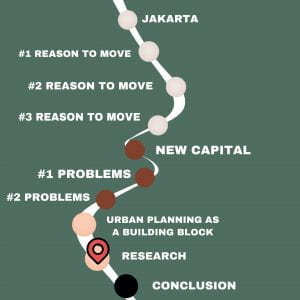
I have been writing about the relocation of the capital of Indonesia for quite some time and all the findings are based on research by the experts. However, I feel like it is also important to listen to the opinion of the locals. That is why I sent out a survey to 16 Indonesians from Jakarta. 8 of them are around 19-21 years old ( younger generation ) while 8 of them are my parents’ friends who are around 40-50 years old ( older generation ). They all are not aware that I am writing a blog about the relocation of the capital so their perception about this topic is not biased.
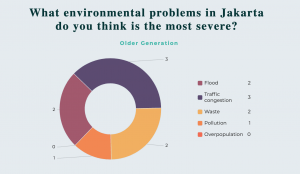
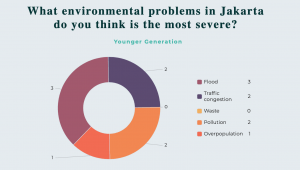
From the survey findings shown in Fig. 1 and 2, both people from the younger and older generation agree that flood and traffic congestion are the top 2 most severe environmental problems in Jakarta. Other than that, waste problems seem to be more prominent for the older generation while pollution is more experienced by the younger generation.
However, I found one interesting finding: while people are fixated on these visible problems, many forget that the root cause of these problems is overpopulation, which is stated by one person from the younger generation. This could change the whole approach of the government as it is a deciding factor for their priorities in policymaking: they could craft policies that could tackle the symptoms of the problem ( such as reducing the supply of cars, creating a more effective waste management infrastructure, etc ) or the root cause of the problem ( transmigration, etc ).
Next, I asked the respondents that considering all these urban environmental problems, should the government relocate the capital?
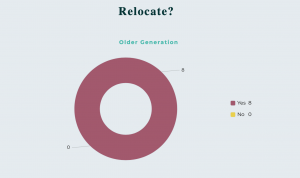
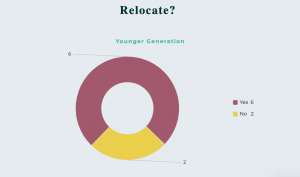
The result shown in Fig. 3 and 4 is quite surprising because the majority in both age groups agree that the Indonesian government should relocate the capital. 2 people from the younger age groups state that they should not relocate because the infrastructure is not ready yet and it is not economically feasible. One person agrees, though, that simply moving the capital city to another location will not solve the root problem immediately as chances are the same issues might happen in the new location if there are no strategies implemented by the government.
However, it is quite interesting to see how many people from Jakarta still put emphasis on feasibility and economic capability for the consideration of the relocation instead of potential biodiversity loss and deforestation. In other words, there is a tendency for Indonesians to put a higher emphasis on socio-economic factors as compared to environmental considerations in decision-making processes in Indonesia.
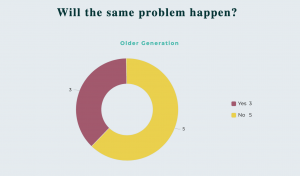
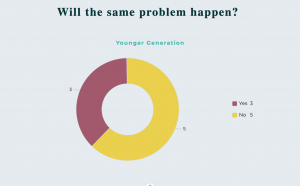
Personally, I think the results got more interesting as the majority of the people in both age groups convey an optimistic tone in the relocation of the capital. Most of them believe that the same problem will not happen, especially if there is long-term proper planning and management. Some highlighted that the business centre is going to be in Jakarta and it will not really impact the new capital. Some people also highlighted that it is good to relocate to Kalimantan to increase the equity of the income distribution in Indonesia. These answers reinforce the fact that people in Indonesia generally put greater weight in socio-economic factors, not environmental factors.
What do you think of these findings? Let me know in the comments!
Hi Sherry! Great blog post! Loved the graphics of your blog.
How do you think that the citizens can be encouraged to care more for the potential biodiversity loss and deforestation since it is a large problem there in Indonesia?
Hi Chloe! Thank you for your kind compliment! Regarding to your question, I guess the most common yet effective solution would be thru education. Ever since young, schools should teach children regarding the importance of conservation and the amazing flora and fauna that Indonesia has.
Personally speaking, when I was little, my school always brings me to zoos and conservation sites ( like Taman Safari in Bogor ) so that I have a greater understanding of the biodiversity. They also taught me about the loss of forests, and the reducing population of Orangutan, which appeals to me emotionally as a child and therefore I had a greater understanding of biodiversity loss. I guess such first-hand experiences could help shape the understanding and raise awareness of biodiversity loss and deforestation, especially in Indonesia.
Cheers
Sher
Hi Sherry!
Given that money talks, I’m not surprised that your survey results found that most Indonesians are focused on the socio-economic factors. However, I’m particularly drawn to the phrase “increase the equity of income distribution in Indonesia”, which I took to mean that the income gap among Indonesians will narrow as a result of the shifting of capital. But by examining the GDP per capita/minimum wage of East Kalimantan (the province where the new capital will be situated) and DKI Jakarta, I couldn’t really see an obvious gap in financial status (155.1 million IDR vs 174.8 million IDR) (2,026,000 IDR vs 2,700,000 IDR). Hence I wonder if it’s wise to use the income gap as an argument for shifting capitals when the gap is relatively small, to begin with.
Cheers,
Yu Xun
Hi Yuxun! Thank you for stopping by! Thank you for raising this up too! However, what I meant was the concentration and the amount of GDP contribution to the whole economy. For example, the island of Java contributed around 58% of the total economic growth of Indonesia as compared to Kalimantan, which only contributed less than 9% of the whole economic growth of the country. Perhaps my phrasing is a bit confusing so I hope this clarifies! Thank you
Cheers
Sher
Hi Sherry!
Thanks for the clarification! It definitely helped to clear up some of the confusion I’d with the statement.
Cheers,
Yu Xun
Hi Sherry,
So much to love about this post ! It raises several questions in my mind. For one, how might responses differ between ppl already living in Jakarta and ppl living in Kalimantan. I especially wonder about indigenous ppl in Kalimantan, specifically the Dayak ppl. Have you thought about that at all, i.e., the perspective of the ppl who already live in the area ?
jc
Hi Dr Coleman! Thank you for your kind comment! Sorry that I only managed to reply now because the email went to my spam.
I think that the responses will differ between the people from Jakarta and Kalimantan because the locals in Kalimantan will have a greater sense of attachment towards their location. Perhaps, some of the people who resides in Kalimantan will feel happy because there are greater socio-economic and job opportunities in the region and they can find more jobs in the new capital. However, I feel that most of them will fear about the destruction of the forests. Moreover, some people especially the Dayak tribes will feel even more marginalised. Why “even more”? It is because previously the government had “stole” their lands to new transmigrants and did not treat the indigineous people with respect or a sense of dignity. In my opinion, they may feel that the urbanisation in those areas will further shrink their land spaces and eventually they will lose their homes. But these are all my speculative opinions since I could not conduct the survey first hand and it is rather difficult to find such perception surveys.